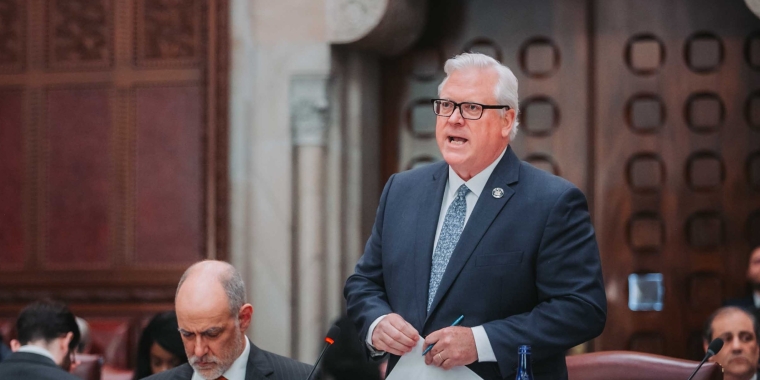
O’Mara and Hannon sponsoring 'Drug Take Back Act' to prevent opioid abuse and protect water supplies (UPDATE, January 17: Legislation reported out of Senate Health Committee)
January 16, 2018

Albany, N.Y., January 16—State Senator Tom O’Mara (R,C,I-Big Flats), Chair of the Senate Environmental Conservation Committee, and Senator Kemp Hannon (R-Nassau), Chair of the Senate Health Committee, have introduced legislation to further combat the abuse of prescription drugs and prevent unused drugs from contaminating water supplies.
[UPDATE, January 17: Earlier today, the Senate Health Committee reported the legisaltion and it will now go before the full the full Senate for a vote.]
The O’Mara-Hannon “Drug Take Back Act” (S7354) calls for the establishment of an industry-funded, statewide pharmaceutical drug take-back program. It advances a “product stewardship” approach to the challenge of disposing of unwanted medications. Pharmaceutical manufacturers would be responsible for all of the costs of the initiative including public education and awareness, as well as the collection, transport, and destruction of unwanted drugs. The Act further requires chain pharmacies and mail-order pharmacies to provide consumers with on-site collection, prepaid mail-back envelopes, or other federally approved methods to encourage safe drug disposal.
O’Mara said, "It's incredibly important to do anything and everything we can to complement and support the efforts of local law enforcement and other community leaders to combat prescription drug abuse. These efforts include National Prescription Drug Take-Back Days and other initiatives like this one to facilitate the collection, and safe and responsible disposal of unused medications. This proposal to greatly expand the number of permanent, locally based drop-off locations would be a very positive, cost-effective addition to the state's ongoing, overall strategy to protect our communities and local environments."
Hannon said, “New York, like the rest of the nation, continues to struggle with the opioid addiction crisis. Despite our best efforts to stem the tide of opioid related deaths, the number of deaths continue to rise. Due to the fact that some drug addictions are first supplied by leftover medication a family member or friend did not use, cutting off that supply is essential. This legislation will hold manufacturers rather than consumers financially responsible for safely managing the disposal of their products. With chain pharmacies providing for collection, we will be able to reach more consumers, ensuring a successful program.”
The lawmakers noted that while law enforcement agencies have drop-off points and collection boxes – and other government agencies conduct drug take-back days to help properly and safely dispose of many drugs -- more must be done. Other state-level initiatives to expand the number of permanent collection sites in communities are conducted on a voluntary basis, are limited in scope, and participation remains low. They added that “product stewardship” is the concept that the manufacturers, producers, or sellers of a product should take responsibility for minimizing the product's environmental impact throughout all stages of its life cycle, including disposal, recycling, or destruction. O’Mara sponsors a similar “Paint Stewardship Act” to facilitate the recycling of unused paint, for example.
The proposed Drug Take Back Act would create a unified, statewide drug take-back program that would save government and taxpayer dollars, and reduce medication misuse. Additionally, the program would protect New York State’s waterways by preventing drugs from being improperly disposed of by flushing or other means that contaminate water bodies and negatively affect aquatic life. Last year, New York made a historic investment in improving and protecting state waterways. Keeping drugs out of water supplies is another important and necessary step.
The Senate Health Committee will take first action on the legislation this week.
Share this Article or Press Release
Newsroom
Go to Newsroom


